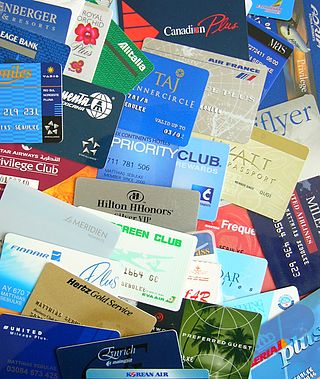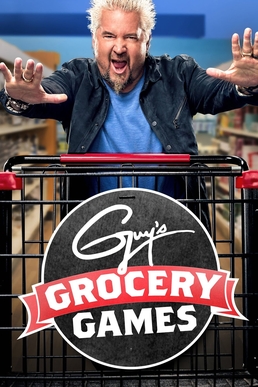
A loyalty program is a marketing strategy designed to encourage customers to continue to shop at or use the services of a business associated with the program. A loyalty program typically involves the operator of a particular program set up an account for a customer of a business associated with the scheme, and then issue to the customer a loyalty card which may be a plastic or paper card, visually similar to a credit card, that identifies the cardholder as a participant in the program. Cards may have a barcode or magstripe to more easily allow for scanning, although some are chip cards or proximity cards.

A supermarket is a self-service shop offering a wide variety of food, beverages and household products, organized into sections. This kind of store is larger and has a wider selection than earlier grocery stores, but is smaller and more limited in the range of merchandise than a hypermarket or big-box market. In everyday U.S. usage, however, "grocery store" is often used to mean "supermarket".

A shopping cart, trolley, or buggy, also known by a variety of other names, is a wheeled cart supplied by a shop or store, especially supermarkets, for use by customers inside the premises for transport of merchandise as they move around the premises, while shopping, prior to heading to the checkout counter, cashiers or tills. Increasing the amount of goods a shopper can collect increases the quantities they are likely to purchase in a single trip, boosting store profitability.

An honor system, trust system or honesty system is a way of running a variety of endeavors based on trust, honor, and honesty.

Piggly Wiggly is an American supermarket chain operating in the American Southern and Midwestern regions run by Piggly Wiggly, LLC, an affiliate of C&S Wholesale Grocers. Its first outlet opened in 1916 in Memphis, Tennessee, and is notable as the first true self-service grocery store, and the originator of various familiar supermarket features such as checkout stands, individual item price marking and shopping carts. The current company headquarters is in Keene, New Hampshire. 499 independently owned Piggly Wiggly stores currently operate across 18 states, primarily in smaller cities and towns.
A no-frills or no frills service or product is one for which the non-essential features have been removed to keep the price low. The term "frills" originally refers to a style of fabric decoration. Something offered to customers for no additional charge may be designated as a "frill" – for example, free drinks on airline journeys, or a radio installed in a rental car. No-frills businesses operate on the principle that by removing luxurious additions, customers may be offered lower prices.

Online shopping is a form of electronic commerce which allows consumers to directly buy goods or services from a seller over the Internet using a web browser or a mobile app. Consumers find a product of interest by visiting the website of the retailer directly or by searching among alternative vendors using a shopping search engine, which displays the same product's availability and pricing at different e-retailers. As of 2020, customers can shop online using a range of different computers and devices, including desktop computers, laptops, tablet computers and smartphones.

ShopRite is an American retailers' cooperative of supermarkets with stores in six states: Connecticut, Delaware, Maryland, New Jersey, New York and Pennsylvania.

The Defense Commissary Agency (DeCA), headquartered at Fort Gregg-Adams, Virginia, is an agency of the United States Department of Defense (DoD) that operates nearly 240 commissaries worldwide. American military commissaries sell groceries and household goods to active-duty, Guard, Reserve, and retired members of all eight uniformed services of the United States and eligible members of their families at cost plus surcharge, saving authorized patrons thousands of dollars compared to civilian supermarkets.

Raley's Supermarkets is an independent, family-owned American grocery and retail technology company headquartered in West Sacramento, California. Raley's was founded in 1935 by Thomas P. Raley in Placerville, California.

Finast was a retail supermarket brand that started in the northeastern United States, with headquarters in Somerville, Massachusetts. Finast was an acronym for FIrst NAtional STores. Commonly referred to as "The First National", the stores operated under the First National name for decades, while the Finast acronym was reserved for its store-brand products. Several years later, most of its stores were renamed Finast during a modernization effort.

Bottom Dollar Food was an American soft-discount grocery chain. It was a subsidiary of Delhaize America, the U.S. division of international food retailer Delhaize Group. Its headquarters was in Salisbury, North Carolina.
Shop fitting (shopfitting) is the trade of fitting out retail and service shops and stores with equipment, fixtures and fittings. The trade applies to all kinds of outlets from small corner shops to hypermarkets. A shop fitter executes planning, designs shop layout and installs equipment and services. A shop fitting firm typically incorporates professional expertise in interior design, manufacturing of bespoke furniture, signage and fittings and purchasing of retail equipment.

Amazon Fresh is a subsidiary of the American e-commerce company Amazon in Seattle, Washington. It is a grocery retailer with physical stores and delivery services in most major U.S. cities, as well as some international cities, such as Berlin, Hamburg, London, Milan, Munich, Rome, Tokyo, and some other locations in Singapore and India.

Omnichannel retail strategy, originally also known in the U.K. as bricks and clicks, is a business model by which a company integrates both offline (bricks) and online (clicks) presences, sometimes with the third extra flips.
Email remarketing refers to the email systems used by merchants to follow up with website visitors who do not make a desired purchase action. It is a development of email marketing that aims to re-attract website viewers or customers. In other words, the whole idea of email remarketing is attracting customers or users back for purchase, growing repeated customers.

Ruler Foods, Inc. is a discount warehouse store grocery chain in the United States, currently owned by Kroger, and headquartered in Seymour, Indiana. It is a no-frills grocery store where 80% of the offerings are Kroger Brand, the customers bag their own groceries at the checkout, and rent shopping carts for 25 cents. Kroger operates Ruler Foods stores in Illinois, Indiana, Ohio, Kentucky, Missouri, and Tennessee.
Online supermarkets in China are shopping websites that offer grocery buyers a complete shopping solution from a single online platform. The emphasis on these sites is to provide consumers all the products they would normally find on a supermarket shop floor, but delivered direct to the house or office door. Customers pay for goods with popular online payment systems such as Alipay, or by bank transfer, or cash on delivery.

Guy's Grocery Games is an American reality-based cooking television game show hosted by Guy Fieri on Food Network. Each episode features four chefs competing in a three-round elimination contest, cooking food with ingredients found in a supermarket grocery store as Guy Fieri poses unusual challenges to them. The winning chef of the episode can collect up to $20,000 in a shopping spree bonus round. The show often features chefs from Diners, Drive-Ins, and Dives, another show hosted by Fieri. The show Dessert Games was a short-lived spin-off.

Maplebear Inc., doing business as Instacart, is an American delivery company based in San Francisco that operates a grocery delivery and pick-up service in the United States and Canada. The company offers its services via a website and mobile app, allowing customers to order groceries from participating retailers with the shopping being done by a personal shopper.















